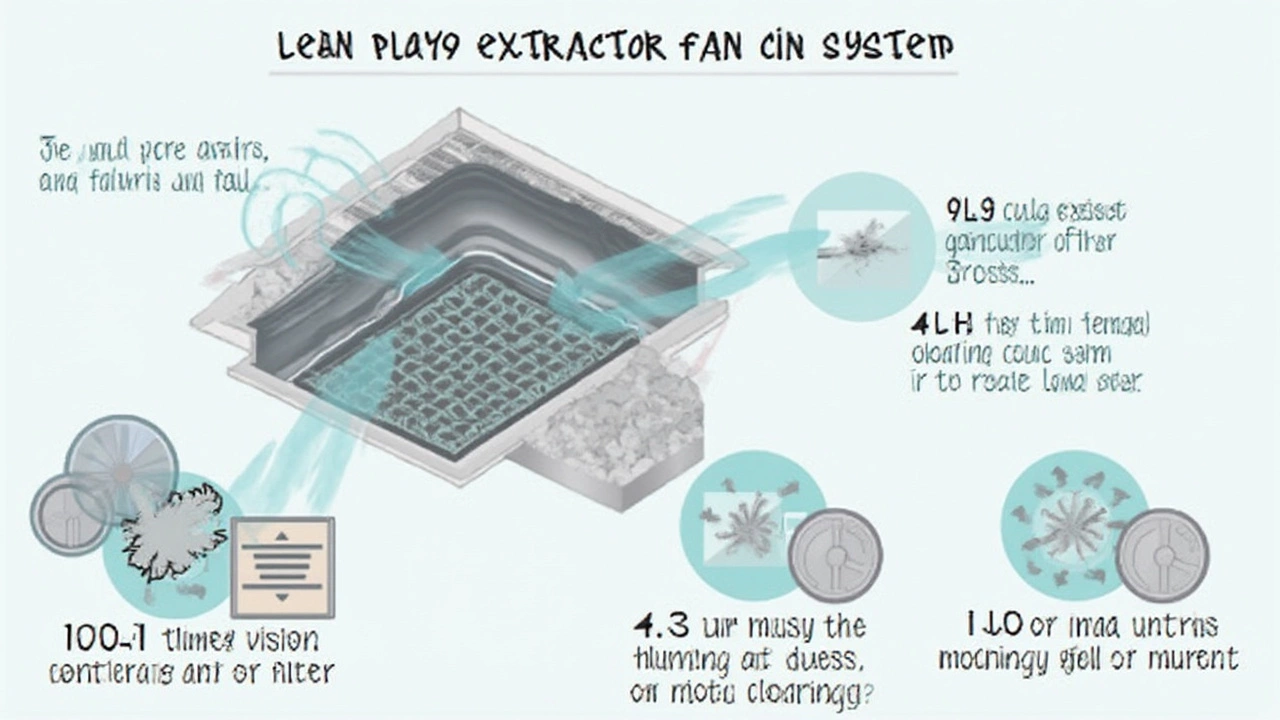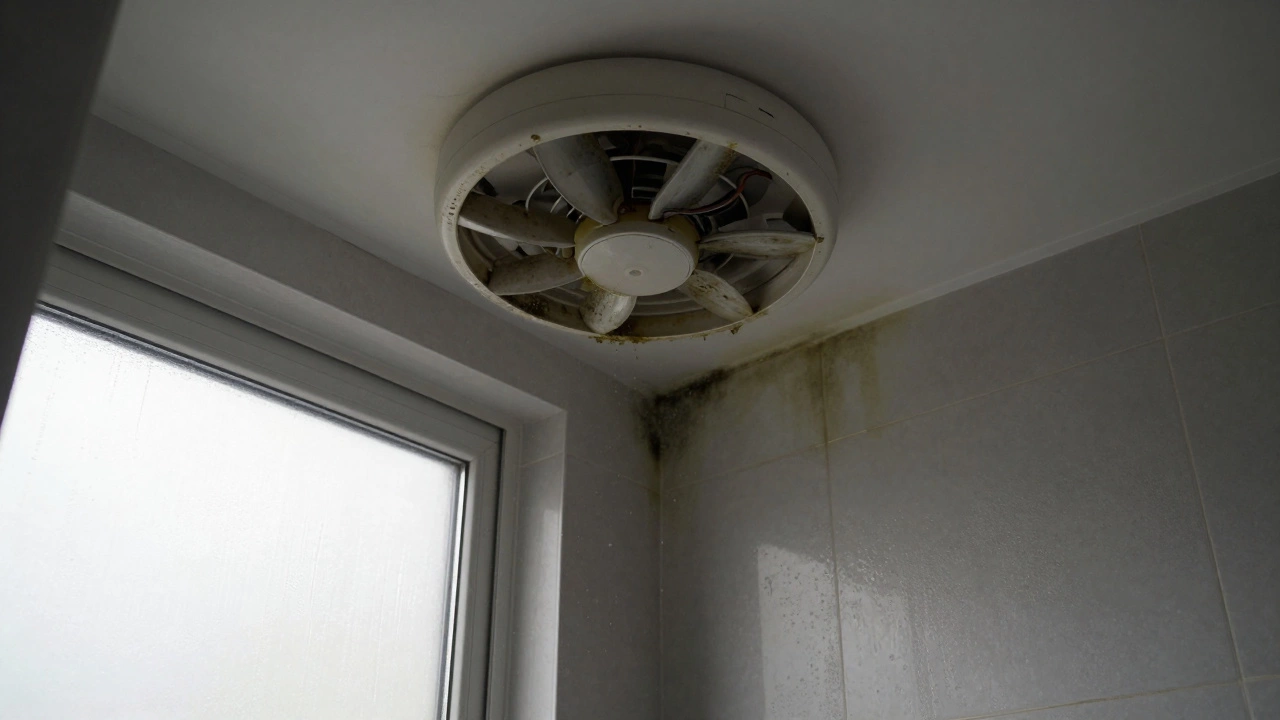
- 4 Jun 2025
- Gideon Thornton
- 0
If you've got an extractor fan buzzing away in your kitchen or bathroom, chances are you haven't thought much about it—unless it started making weird noises or stopped working. But those little fans do a lot more for your home than you might think: they pull out moisture, odors, and all sorts of airborne grime before it can do any real damage.
Now, you might wonder, do extractor fans really need maintenance? The quick answer: absolutely. Ignore them, and things get ugly fast—mold creeps in, your air gets musty, and before you know it, you're dealing with repairs that’ll make you regret skipping a simple cleaning.
Most fans suffer not from age but from dirt buildup and blocked vents. You’ll end up paying more on energy bills too, because a clogged fan has to work overtime just to move a bit of air. Plus, a dusty fan is a noisy fan—no one wants a rattling monster waking the whole house every time the bathroom light comes on.
- Why Extractor Fans Need Attention
- What Happens If You Ignore Maintenance
- Common Signs Your Fan Needs Help
- DIY Cleaning and Care Tips
- When to Call in a Pro
- Keeping Your Fan Running Smoothly
Why Extractor Fans Need Attention
Extractor fans might seem like a set-and-forget appliance, but ignoring them is a shortcut to a sweaty, smelly mess. These fans pull out everything you don’t want lingering in your home—think cooking smoke, shower steam, and sometimes even airborne grease. If your aim is clean air and a mold-free home, extractor fan maintenance matters more than you may guess.
Everyday use means dust, fluff, and even sticky kitchen vapors get sucked into the fan. When this stuff builds up, your fan can’t work right. That’s not just inconvenient—it’s risky. A blocked fan raises humidity levels, leading to mold and even damage to paint, wallpaper, and ceilings. In kitchens, greasy fans become fire hazards faster than most people realize.
Let’s get specific. Here’s what a well-maintained fan does for you:
- Keeps air moving to fight off damp and mildew
- Pulls out strong smells so your house doesn’t stink
- Reduces allergens and dust floating around
- Prevents moisture buildup that ruins surfaces and grows black mold
- Saves money by running efficiently instead of chugging extra power
It’s not just about avoiding gross air or weird smells. Experts from the British Lung Foundation have warned that humidity and mold are a real threat to anyone with allergies or asthma. In fact, homes with poorly working extraction systems have up to extractor fan maintenance issues three times more often, according to a 2021 survey of UK households.
| Issue | Chance if Fan is Maintained | Chance if Ignored |
|---|---|---|
| Mold Growth | 9% | 33% |
| Bad Odors | 14% | 42% |
| Fan Failure | 4% | 17% |
So, if you want to keep your fan running quietly and your home free from that funky damp smell, giving your extractor a bit of attention isn’t just a good idea—it’s a must.
What Happens If You Ignore Maintenance
Let’s get real: skipping extractor fan maintenance isn’t just about dealing with a bit of dust. It’s a fast track to bigger hassles that are way more annoying and expensive than a routine clean. When you ignore that fan, the first thing to suffer is airflow. A clogged fan can’t pull moisture out of your bathroom or kitchen, so steam and smells hang around way longer. Next thing you know, you’re scrubbing mold off tiles and ceilings—or worse, it gets into the walls where you can’t see it.
If moisture keeps building up, wallpaper starts peeling, and paint bubbles or cracks. I’ve even seen wooden windowsills rot from constant steam. That’s not just ugly, it’s costly to fix. And let’s not forget that dust and grease inside a fan slow it down. When that happens, the motor has to work harder, making your energy bill creep up. If the motor burns out, you’ll end up replacing the entire unit.
Noise is another dead giveaway. A fan that rattles, whines, or grinds is begging for maintenance. Annoying sounds usually mean dust or debris is stuck somewhere or that the bearings are running dry. Sometimes people just unplug the fan or switch it off at the wall to avoid the racket—only to land right back in the humidity mess.
- Your home’s air quality drops, which is especially bad for anyone with allergies or asthma.
- You risk long-term water damage—something most insurance companies won’t cover if it’s down to neglect.
- Funky smells get trapped inside, and sometimes you just can’t air them out without a working fan.
Here’s the deal: regular extractor fan maintenance isn’t just for show. It makes the difference between a fresh, healthy space and one with problems that sneak up on you—and hit your wallet hard.
Common Signs Your Fan Needs Help
Extractor fans rarely just stop working out of nowhere. Usually, they try to tell you something's up way before they give out completely. Paying attention to these warning signs can save you a headache (and cash) down the line.
- Fan gets louder or rattles: When your fan used to hum quietly and now it sounds like a blender, something's off. That noise means dust, dirt, or maybe even a loose screw is making the motor struggle.
- Moisture clings to surfaces: If your mirror stays foggy way longer than usual or you spot random wet patches on walls, your fan probably isn’t moving air the way it should.
- Strange or burnt smells: Smelling something funky or even a slight burning odor? That’s usually buildup on the fan blades or, worse, the motor overheating.
- Low airflow: Hold a tissue up to the fan when it’s running. If it doesn’t pull the tissue upward, you’ve got a blockage or a failing motor.
- Visible dirt or grime: Take off the fan cover and check inside. If you’re hit with dust bunnies and greasy gunk, it’s cleaning time.
Here’s a quick look at how often these signs pop up in average UK households, based on a 2023 survey by HouseFresh:
| Problem | % of Homes Affected (Yearly) |
|---|---|
| Loud or noisy fans | 41% |
| Low airflow | 28% |
| Lingering moisture/mold | 31% |
| Unusual smells | 19% |
If any of this sounds familiar, your fan could be crying out for attention. Here’s what the experts say:
"Regular maintenance is the number one way to extend the life of your home ventilation system and ensure consistent air quality." – UK Building Research Establishment
Skipping these early warnings can mean bigger, messier (and pricier) problems soon. Catching them now is way easier than dealing with black mold or swapping out a burnt motor later.

DIY Cleaning and Care Tips
Your extractor fan puts in work you don’t usually see, so it deserves some attention every now and then. The average fan pulls in a lot of gunk—grease in the kitchen, dust and hair in the bathroom, and plenty of general dirt. If you handle basic cleaning yourself, you’ll dodge most of the common problems that make fans noisy or useless.
Before you start, always switch off the power at the fuse box. No one needs a surprise jolt while cleaning a fan. Grab a screwdriver, a soft brush, and a damp cloth. A vacuum with a brush attachment can make things go faster too.
- Remove the cover: Most fan covers pop off with a gentle tug or a twist of the screws. Watch for hidden latches.
- Wipe off any visible dust or grime from the cover. If it’s caked on, soak the cover in warm soapy water for ten minutes, then brush it clean.
- For the fan blade, hold the blade steady and wipe each fin. If your fan is especially greasy (kitchen fans usually are), a mix of warm water and dish soap works well.
- Use your vacuum’s brush tool to suck up loose dirt inside the unit and around the motor (but don’t poke anything sharp into the motor itself).
- Pop the cover back once everything is dry. Tighten the screws, but don’t force them—you don’t want to crack the plastic.
Experts recommend a quick clean every 3-6 months, especially in well-used spots. According to Vent-Axia, a top UK fan manufacturer, “Build-up of dust and debris is the leading cause of fan failure in domestic homes.”
“Even a thin layer of dirt can reduce airflow by up to 20%, making the fan work harder and break down sooner.” — Vent-Axia Technical Bulletin, 2024
If you’re not sure how often you’re cleaning, set a reminder in your phone—it beats guessing next time you smell something off in the bathroom.
Wondering how much difference a clean fan can make? Check this quick breakdown:
| Condition | Expected Airflow (cu.m/h) | Power Usage (Watts) |
|---|---|---|
| Clean Fan | 85 | 15 |
| Dusted Fan | 68 | 17 |
| Clogged Fan | 42 | 21 |
A little elbow grease goes further than you think. And if you're dealing with tough grime or can’t reach the ductwork, think about calling in a pro before anything gets damaged. But for most cases, these tips will keep your extractor fan maintenance hassle-free—and maybe even quieter.
When to Call in a Pro
There’s a fine line between what you can sort out yourself and when it’s smarter (and safer) to call in an expert. If you’ve already tried the basic cleaning tricks—like taking off the cover and brushing off the dust, or making sure nothing’s obviously blocking the airflow—but the problem sticks around, that’s your first sign.
Some signs scream “time for a pro.” Here’s what to look out for:
- You notice burnt smells or see sparks when the fan is on.
- The fan just hums or buzzes loudly but isn’t moving any air.
- Switches or wiring seem loose or damaged (or you suspect an electrical issue).
- You’ve got mold building up around the fan, even after cleaning.
- There’s water dripping out of the fan or down the wall (never a good sign).
Handling any of these can get risky, especially if you’re not comfy dealing with electrics. According to the Institution of Engineering and Technology,
“DIY electrical work is one of the main causes of house fires each year. If in doubt, always hire a certified professional.”
Also, if your extractor fan is still under warranty, trying to fix trickier issues on your own can void all those warranty perks before you know it. Most manufacturers want a licensed electrician or authorized repair specialist to handle anything that goes deeper than basic cleaning.
And if your place relies on strong ventilation—like a windowless bathroom, or you’ve got an allergy sufferer at home—it’s even more important not to gamble. Pros can test airflow properly, spot hidden damage, and make sure the extractor fan maintenance work is done safely and to code.
Long story short, don’t risk your safety or your house. Got those warning flags? Get a pro in, save yourself headaches, and keep the air at home healthy.
Keeping Your Fan Running Smoothly
If you want your extractor fan to last, a little regular attention goes a long way. You don’t need to be an engineer—just keep it simple and keep a routine.
First, give it a quick visual check every month. If you see dust or greasy buildup, it’s time for a clean. Most manufacturers recommend cleaning the cover and visible blades every 3-6 months. A vacuum cleaner with a brush attachment works for loose dust, and a damp cloth with a bit of dish soap handles grease. Always turn off the power at the wall before you start poking around.
- Wipe the vent cover and fan blades with a damp cloth to clear out dust and grime.
- If you see mold, use a solution of 1 part vinegar to 1 part water. Let it sit a few minutes before wiping clean.
- Vacuum or gently brush around the motor area, but avoid getting it wet.
Don’t ignore the ductwork. Kitchen ducts, especially, get clogged with grease. If you can reach it, give it a light clean; if not, consider a pro clean once a year.
Next, pay attention to sounds and smells. If the fan gets louder, rattles, or starts to smell burnt, it’s a sign something’s jamming. Fans running 24/7 or used in heavy-duty spots (think a busy family kitchen) need extra care.
| Task | Recommended Frequency |
|---|---|
| Wipe Cover and Blades | Every 3-6 months |
| Check for Blockages | Monthly |
| Deep Clean Kitchen Ducts | Yearly |
| Listen for Unusual Noises | Every Use |
| Professional Service | Every 2-3 years |
Changing the filter is another easy win for extractor fan maintenance. Not every model has a filter, but if yours does (most kitchen hoods do), swap it out every few months, especially if you cook a lot. Grease filters are cheap, usually metal or fabric, and make a huge difference.
One last thing—keep the air flowing! Don’t block the intake with towels, furniture, or clutter. Good airflow helps your fan do its job right and keeps moisture, smells, and heat from sticking around.




